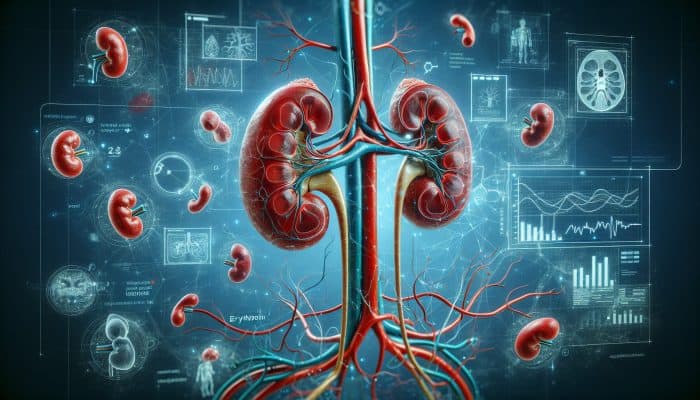Discover the Crucial Roles of Kidneys for Enhanced Health
Understanding How Kidneys Contribute to Your Overall Wellness

The kidneys function as essential organs in the human body, performing a variety of critical tasks that are vital for maintaining overall health and wellbeing. One of their primary responsibilities is to filter out waste products and excess fluids from the bloodstream, which helps keep the body’s internal environment stable and balanced. This complex filtration process involves more than just eliminating waste; the kidneys are also instrumental in regulating blood pressure by managing fluid levels and maintaining optimal electrolyte balance. Additionally, they secrete hormones like erythropoietin, which stimulate the production of red blood cells essential for effective oxygen transport throughout the body. A thorough understanding of these intricate roles underscores the importance of kidney health and highlights the need for regular monitoring, particularly through consistent kidney blood tests in Newmarket.
Given the kidneys’ pivotal role in various metabolic processes, any decline in their functionality can lead to serious health complications. For instance, when kidney function begins to decline, the body struggles to remove toxins and regulate electrolyte levels, which can lead to severe complications over time. This reality emphasizes the importance of education around kidney operation, particularly for individuals at higher risk of kidney-related illnesses. Understanding how the kidneys work and their essential contributions to health is paramount for proactive health management.
Identifying Common Kidney Health Issues
Various conditions can adversely affect kidney function over time, making regular monitoring through blood tests vital for early detection. One of the most common conditions is chronic kidney disease (CKD), which progressively diminishes renal function and often remains asymptomatic until it reaches advanced stages. Significant risk factors for CKD include diabetes, hypertension, and a family history of kidney disease. Routine blood tests enable healthcare professionals to uncover early signs of CKD, facilitating timely interventions that can dramatically alter the disease’s progression.
Moreover, kidney stones are another widespread health concern characterised by the accumulation of hard deposits made from minerals and salts within the kidneys. While kidney stones may not always exhibit noticeable symptoms, they can lead to severe pain and complications if not treated appropriately. Regularly scheduled kidney blood tests in Newmarket are crucial for identifying potential issues before they escalate into serious health problems, reinforcing the importance of consistent healthcare monitoring.
The Necessity of Regular Kidney Testing
The importance of regular kidney blood tests cannot be overstated. Early detection of kidney-related issues through these tests enables healthcare providers to implement preventative measures or create tailored treatment plans that cater to the patient’s specific needs. Such tests can identify irregularities in kidney function that might otherwise go unnoticed until they become critical, thereby allowing for timely and effective intervention.
For individuals who are at risk—such as those with pre-existing health conditions or a familial history of kidney disease—regular testing is an essential component of health maintenance. Prioritising these important tests allows patients to engage proactively with their healthcare providers, resulting in improved health outcomes and a significant reduction in the risk of serious kidney-related complications.
Effective Preparation for a Kidney Blood Test

Essential Pre-Test Guidelines for Accurate Results
Preparation is critical for achieving accurate results in any medical test, including kidney blood tests. Patients are typically provided with specific pre-test guidelines, which may include fasting for a certain period before the test. This fasting is vital to ensure that the blood results are not influenced by food intake, especially when assessing substances such as creatinine and blood urea nitrogen.
Furthermore, certain medications may need to be temporarily paused prior to the test. This is particularly crucial for medications that can impact renal function or artificially alter test outcomes. Open dialogue with healthcare providers regarding current medications is essential to ensure the reliability and accuracy of the test results.
What Should Patients Expect During the Blood Draw Process?
During the actual blood draw, patients can expect a straightforward and efficient procedure. A trained healthcare professional will typically take a small blood sample from a vein in the arm. This process is quick and generally causes little more than a minor pinch. Being informed about what to expect can significantly alleviate any anxiety related to the test, helping patients approach the procedure with greater confidence and ease.
It is also worth noting that blood tests are often conducted at local clinics or hospitals, including those in Newmarket. Patients are encouraged to reach out with any questions or concerns regarding the process, as this can greatly enhance their comfort level during the testing experience.
Post-Test Care: Essential Guidelines for Recovery

After completing a kidney blood test, patients can generally return to their normal activities without restrictions. However, it is essential to remain vigilant regarding the puncture site from which blood was drawn. Patients should monitor the area for any signs of bleeding or infection, such as increased redness, swelling, or tenderness.
If any unusual symptoms occur, it is crucial to promptly contact a healthcare provider. Although complications are rare, being informed and vigilant can provide peace of mind after the test. Additionally, discussing the expected timeline for receiving results with the healthcare provider can help patients manage their expectations effectively.
Interpreting Test Results: Gaining Clarity and Confidence
Once test results are available, healthcare providers will take the time to explain them to patients clearly and understandably. Understanding these results is vital for assessing kidney function and diagnosing potential conditions such as kidney disease or monitoring the effectiveness of ongoing treatment plans.
Patients should feel empowered to ask questions about their results, including what constitutes normal ranges and what any deviations may indicate. This engagement fosters a deeper understanding of one’s health and encourages proactive health management, especially concerning maintaining renal health.
Thoroughly Understanding Kidney Blood Test Results
Key Indicators of Kidney Function to Monitor Closely
Interpreting kidney blood test results requires familiarity with several key indicators of renal function. Among these, creatinine levels serve as a primary marker, providing insight into the kidneys’ efficiency in filtering waste from the blood. Elevated creatinine levels can suggest compromised kidney function, often necessitating further investigation and testing.
Blood urea nitrogen (BUN) is another significant measurement that reflects the concentration of nitrogen in the blood resulting from urea, a waste product produced during protein metabolism. Both BUN and creatinine levels are typically assessed together to gauge kidney health and can indicate the severity of kidney impairment when elevated.
Moreover, the glomerular filtration rate (GFR) is a vital indicator that quantifies kidney function by estimating how efficiently the kidneys filter blood. Understanding these key indicators empowers patients to take an active role in their health while collaborating effectively with healthcare professionals regarding treatment options or necessary lifestyle adjustments.
Grasping Normal Ranges for Kidney Function Indicators
Normal ranges for kidney function indicators may vary slightly across different laboratories, but they generally reflect healthy kidney activity. For instance, a typical creatinine level for adults typically falls within the range of 60 to 110 µmol/L, while normal BUN levels usually range from 2.5 to 7.1 mmol/L.
Understanding these normal ranges is crucial for contextualising test results. If a patient’s results fall outside these parameters, it does not necessarily indicate a serious issue; rather, it suggests that further investigation or monitoring may be warranted. Engaging with healthcare providers to accurately interpret these results empowers patients to gain a clearer understanding of their kidney health.
When Should You Seek Additional Medical Guidance?
Patients who receive abnormal results should not hesitate to seek further consultation from their healthcare providers. While not all irregularities indicate severe conditions, they may require additional tests or closer monitoring. This proactive approach is particularly vital for individuals already at risk for kidney issues due to pre-existing health conditions.
Maintaining open lines of communication with healthcare providers is essential, as they can offer guidance, suggest lifestyle modifications, or initiate customised treatment plans based on individual circumstances. Taking timely action on abnormal results can significantly increase the likelihood of positive health outcomes and help preserve kidney function over time.
Finding Kidney Blood Testing Services in Newmarket
Accessible Local Clinics and Hospitals for Testing Services
Newmarket is home to a variety of healthcare facilities where residents can conveniently access kidney blood tests. Notable locations include Newmarket Hospital, which provides a comprehensive range of diagnostic services, including evaluations of kidney function. Local GP surgeries also offer blood testing services, ensuring that residents can receive the necessary care without extensive travel.
When looking for a kidney blood test in Newmarket, it is advisable to consult with your local GP or healthcare provider to identify the most suitable facility. Some clinics also provide extended hours or urgent care options, catering to the diverse needs of the community and enhancing accessibility.
Streamlined Appointment Scheduling for Blood Tests
Patients can easily book appointments for kidney blood tests through either the NHS or private clinics in Newmarket. The NHS offers a streamlined referral process, often allowing patients to schedule tests during routine check-ups. For those opting for private healthcare options, many local clinics provide the flexibility of self-referral and direct booking.
Planning ahead is vital, especially during busy periods, to ensure timely access to testing services. Additionally, patients should consider discussing any concerns or specific requirements with clinic staff when making their appointment to ensure a tailored and accommodating experience.
Understanding Costs and Insurance Coverage for Testing Services
The costs associated with kidney blood tests can vary depending on whether they are performed through the NHS or a private facility. Generally, NHS tests are covered for eligible patients; however, private tests may incur fees that can differ greatly depending on the provider.
Patients with insurance should verify their policy to determine if kidney blood tests are covered. Understanding potential costs in advance empowers patients to make informed decisions regarding their healthcare options and the financial implications associated with testing.
The Advantages of Ongoing Kidney Monitoring
Enabling Early Detection of Potential Health Issues
One of the most significant benefits of consistent kidney monitoring is the early detection of potential health concerns. Routine blood tests can uncover abnormalities in kidney function before they develop into more severe conditions. This proactive approach is especially crucial for individuals at higher risk, as early intervention can greatly improve treatment outcomes and overall health.
When kidney problems are identified early, healthcare providers can implement necessary lifestyle changes, prescribe medications, or explore other interventions that can significantly reduce the risk of progression to chronic kidney disease or other serious health conditions. The peace of mind that accompanies knowing one’s kidneys are healthy can also motivate patients to take a more active role in their overall health management.
Effectively Managing Existing Chronic Health Conditions
For individuals already diagnosed with chronic conditions that impact the kidneys, regular testing serves as a valuable tool for effectively managing their health. These tests assist in adjusting treatment plans that reflect the individual’s current condition and overall health profile. Ongoing monitoring of kidney function over time informs healthcare providers about the effectiveness of medications or lifestyle adjustments, allowing for timely modifications.
Chronic kidney disease, for instance, requires continuous assessment to successfully guide treatment decisions. Regular kidney blood tests in Newmarket empower patients to take charge of their health, ensuring they remain informed and actively engaged with their treatment strategies.
Providing Peace of Mind Through Consistent Kidney Health Monitoring
Maintaining kidney health through regular monitoring can offer substantial peace of mind. Knowing that one’s kidneys are functioning optimally fosters a proactive approach to health maintenance. Regular tests confirm that lifestyle choices—such as a balanced diet and consistent physical activity—are positively influencing kidney function.
This reassurance can motivate individuals to stay committed to their health goals, creating a positive feedback loop that reinforces healthy behaviours. Ultimately, an emphasis on kidney health contributes not only to physical wellbeing but also to overall mental and emotional health, fostering a holistic approach to personal wellness.
Key Lifestyle Factors Influencing Kidney Health
The Importance of Diet and Hydration in Supporting Kidney Function
Diet plays a crucial role in maintaining kidney health. A balanced diet abundant in fruits, vegetables, whole grains, and lean proteins can significantly enhance optimal kidney function. For example, lowering sodium intake can relieve pressure on the kidneys, particularly for individuals with high blood pressure or existing kidney conditions.
Hydration is equally vital; ensuring adequate fluid intake allows the kidneys to effectively flush out toxins and waste products. Dehydration can lead to concentrated urine and increase the likelihood of developing kidney stones, further emphasising the importance of consuming sufficient water throughout the day. Educating oneself about healthy food choices and proper hydration can make a significant difference in kidney health and overall wellbeing.
The Role of Exercise and Weight Management in Kidney Function
Regular physical activity is fundamental to a healthy lifestyle and profoundly affects kidney health. Engaging in consistent exercise aids in weight management, lowers blood pressure, and improves cardiovascular health—all of which are critical factors in preventing kidney disease.
Individuals should aim for at least 150 minutes of moderate exercise each week, incorporating enjoyable activities to promote consistency and commitment. Maintaining a healthy weight further reduces the risk of developing conditions such as type 2 diabetes and hypertension, both of which are closely linked to kidney health.
Mitigating Risks Associated with Smoking and Alcohol Consumption
The detrimental effects of smoking and excessive alcohol consumption on kidney health are well-documented. Smoking damages blood vessels, reducing blood flow to the kidneys and impairing their function. Similarly, heavy alcohol intake can lead to kidney disease, as it may cause dehydration and elevate blood pressure.
Quitting smoking and moderating alcohol consumption are essential steps toward preserving kidney health. Individuals seeking assistance in making these lifestyle changes can benefit from local health services in Newmarket, which often provide valuable resources and guidance on smoking cessation and responsible drinking habits.
Complementary Health Assessments Alongside Kidney Blood Tests
The Importance of Liver Function Tests in Evaluating Kidney Health
Liver function tests complement kidney blood tests by assessing liver health through the measurement of enzymes, proteins, and other substances present in the blood. Abnormal liver function can negatively affect kidney health, making it essential for patients undergoing kidney blood tests to also consider liver assessments.
These tests can uncover underlying liver diseases or damage that may require intervention. Regular testing provides a comprehensive view of overall health, enabling healthcare providers to create more effective treatment strategies that address multiple organ systems simultaneously. Recognising the connection between kidney and liver function reinforces the significance of thorough health monitoring.
Addressing Common Questions About Kidney Blood Tests
What does a kidney blood test entail?
A kidney blood test evaluates levels of specific substances in the blood to assess kidney function, including creatinine, blood urea nitrogen (BUN), and various electrolytes.
How frequently should I undergo a kidney blood test?
The frequency of testing is based on individual risk factors; generally, individuals at risk may need annual tests, while those with existing kidney issues might require more frequent monitoring.
What are the standard levels for creatinine?
Normal creatinine levels typically range from 60 to 110 µmol/L for adults, although this may vary slightly depending on the laboratory performing the test.
Is fasting necessary before a kidney blood test?
Fasting may be required prior to a kidney blood test, particularly to ensure accurate measurement of specific indicators. It is important to adhere closely to your healthcare provider’s instructions.
Can kidney blood tests assist in diagnosing kidney stones?
While kidney blood tests are not directly used to diagnose kidney stones, they can provide insight into kidney function and highlight related issues.
What should I do if my results come back abnormal?
Contact your healthcare provider immediately to discuss any abnormal results, as they can provide guidance on further evaluation or necessary treatment.
Are kidney blood tests painful?
The procedure involves drawing blood from a vein, which may cause minor discomfort or a quick pinch, but it is generally quick and well-tolerated by most patients.
Will my insurance cover these tests?
Coverage for kidney blood tests varies by insurance provider. It is advisable to review your policy details or consult with your insurance representative for clarification.
How can I enhance my kidney health?
To improve kidney health, maintain a balanced diet, ensure adequate hydration, engage in regular exercise, and avoid smoking and excessive alcohol consumption.
Where can I obtain a kidney blood test in Newmarket?
You can receive a kidney blood test at local clinics, hospitals, or your GP surgery in Newmarket. It is recommended to schedule an appointment for convenience and efficiency.
Connect with us on Facebook!
This Article Was First Found On https://bloodtest.co.uk
The Article Kidney Blood Test: Your Local Newmarket Guide Was Found On https://limitsofstrategy.com



